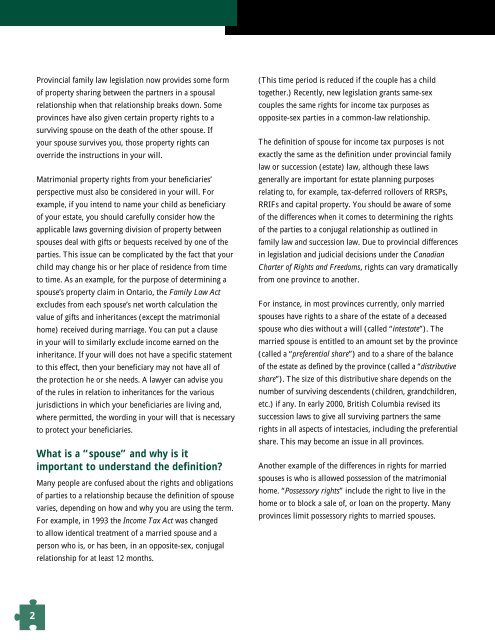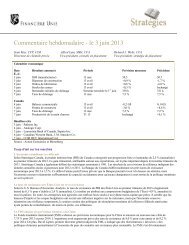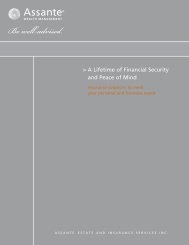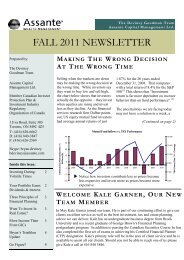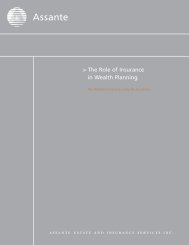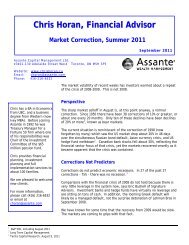Family Law & Estate Planning - Assante Wealth Management
Family Law & Estate Planning - Assante Wealth Management
Family Law & Estate Planning - Assante Wealth Management
Create successful ePaper yourself
Turn your PDF publications into a flip-book with our unique Google optimized e-Paper software.
Provincial family law legislation now provides some form<br />
of property sharing between the partners in a spousal<br />
relationship when that relationship breaks down. Some<br />
provinces have also given certain property rights to a<br />
surviving spouse on the death of the other spouse. If<br />
your spouse survives you, those property rights can<br />
override the instructions in your will.<br />
Matrimonial property rights from your beneficiaries’<br />
perspective must also be considered in your will. For<br />
example, if you intend to name your child as beneficiary<br />
of your estate, you should carefully consider how the<br />
applicable laws governing division of property between<br />
spouses deal with gifts or bequests received by one of the<br />
parties. This issue can be complicated by the fact that your<br />
child may change his or her place of residence from time<br />
to time. As an example, for the purpose of determining a<br />
spouse’s property claim in Ontario, the <strong>Family</strong> <strong>Law</strong> Act<br />
excludes from each spouse’s net worth calculation the<br />
value of gifts and inheritances (except the matrimonial<br />
home) received during marriage. You can put a clause<br />
in your will to similarly exclude income earned on the<br />
inheritance. If your will does not have a specific statement<br />
to this effect, then your beneficiary may not have all of<br />
the protection he or she needs. A lawyer can advise you<br />
of the rules in relation to inheritances for the various<br />
jurisdictions in which your beneficiaries are living and,<br />
where permitted, the wording in your will that is necessary<br />
to protect your beneficiaries.<br />
What is a “spouse” and why is it<br />
important to understand the definition?<br />
Many people are confused about the rights and obligations<br />
of parties to a relationship because the definition of spouse<br />
varies, depending on how and why you are using the term.<br />
For example, in 1993 the Income Tax Act was changed<br />
to allow identical treatment of a married spouse and a<br />
person who is, or has been, in an opposite-sex, conjugal<br />
relationship for at least 12 months.<br />
(This time period is reduced if the couple has a child<br />
together.) Recently, new legislation grants same-sex<br />
couples the same rights for income tax purposes as<br />
opposite-sex parties in a common-law relationship.<br />
The definition of spouse for income tax purposes is not<br />
exactly the same as the definition under provincial family<br />
law or succession (estate) law, although these laws<br />
generally are important for estate planning purposes<br />
relating to, for example, tax-deferred rollovers of RRSPs,<br />
RRIFs and capital property. You should be aware of some<br />
of the differences when it comes to determining the rights<br />
of the parties to a conjugal relationship as outlined in<br />
family law and succession law. Due to provincial differences<br />
in legislation and judicial decisions under the Canadian<br />
Charter of Rights and Freedoms, rights can vary dramatically<br />
from one province to another.<br />
For instance, in most provinces currently, only married<br />
spouses have rights to a share of the estate of a deceased<br />
spouse who dies without a will (called “intestate”). The<br />
married spouse is entitled to an amount set by the province<br />
(called a “preferential share”) and to a share of the balance<br />
of the estate as defined by the province (called a “distributive<br />
share”). The size of this distributive share depends on the<br />
number of surviving descendents (children, grandchildren,<br />
etc.) if any. In early 2000, British Columbia revised its<br />
succession laws to give all surviving partners the same<br />
rights in all aspects of intestacies, including the preferential<br />
share. This may become an issue in all provinces.<br />
Another example of the differences in rights for married<br />
spouses is who is allowed possession of the matrimonial<br />
home. “Possessory rights” include the right to live in the<br />
home or to block a sale of, or loan on the property. Many<br />
provinces limit possessory rights to married spouses.<br />
2


